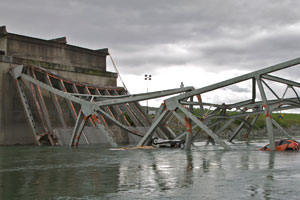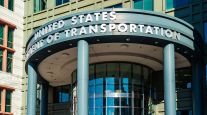Senior Reporter
NTSB: I-5 Bridge Collapse Driver Complied With HOS Rules

A review of a logbook kept by the truck driver who struck a bridge in Washington state in 2013 found no violations of federal hours-of-service rules, according to documents released June 11 by federal transportation safety investigators.
According to the National Transportation Safety Board, William Scott, the driver for Mullen Trucking LP, based in Aldersyde, Alberta, kept a logbook, receipts, and GPS-recorded times and locations that showed he had not violated either the Canadian or U.S. hours-of-service rules.
ACCIDENT DOCKET: NTSB report
The Federal Motor Carrier Safety Administration’s HOS rules place limits on the time drivers are allowed to operate on roadways.
In an interview with NTSB officials, Scott indicated he had attended the Petroleum Institute’s defense driving course in February 2005. As an employee for Mullen, Scott was described as an exemplary driver who earned “safety driving” awards before he was involved in the May 23, 2013, accident that led to the collapse of the Interstate 5 bridge over the Skagit River in Mount Vernon.
The NTSB documents also noted FMCSA rated Mullen Trucking as “satisfactory” less than two months before the accident.
NTSB noted that the new documents are factual but do not provide analyses or make conclusions. The agency plans to release a final report on the investigation this summer, which would include a determination of probable cause.
According to NTSB’s preliminary report, Scott was hauling an oversize load in the early evening hours when he hit the overhead portal and multiple sway braces on the far right side of the I-5 bridge.
Scott was following an escort car with a pole raised to the height of the load. NTSB has determined that as Scott approached the bridge, a southbound truck passed the oversize load in the left lane, causing Scott to feel “crowded” by the passing vehicle. He then moved to the right and collided with the overhead portal and multiple sway braces, according to the preliminary report.
The crash caused a section of the bridge to fall into the river, along with several vehicles. No fatalities were reported. The bridge reopened Sept. 15, after crews installed a new permanent span. The repair project was largely funded by a $15.6 million federal emergency transportation grant.
Commercial trucks make up 11% of the daily traffic along the bridge, according to the Washington State Department of Transportation.




